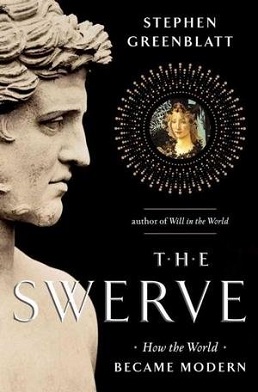Stephen Greenblatt - The Swerve
Stephen Greenblatt 2011. The Swerve. How the world became modern. New York: W.W. Norton, 356 pp.

This book is about scholar famous for preserving latin manuscripts - Poggio Bracciolini (1380-1459) and an almost lost manuscript written ~1500 years earlier, by Roman poet Lucretius (~99-55 BCE). Lucretius’ surviving work is itself based on the physics and philosophy of Epicurus, who lived a further ~300 years earler and was in turn influenced by the pre-Socratics, especially Democritus.
Such promising subject matter. Thus for a long time I had been looking forward to the right moment to read this, so my expectations were probably too high. This might explain wny I found the early “setting the scene” chapters a trifle slow going; given the revolutionary importance of Lucretius they do come across just a touch as filler material. Hardly a fair judgement, they are interesting and of course crucial. However the chapter “The way things are” which is an annotated summary of Lucretius’ On the Nature of Things is downright thrilling for the revolutionary content, the scope of which is extraordinary. For example:
The world and universe is made only of atoms, indivisible and indestructible but infinite in number, in an infinite space. There are gods but they are are utterly indifferent to humans. Religions are cruel. There is no afterlife thus no need to fear death. Nature evolves through adaptations generated by vast numbers of variations. Everything is the result of the smallest possible deviations &mdash swerves &mdash in the paths of atoms. Swerves are the basis of free will.
Swerves also clearly anticipate the butterfly effect, although Stephen Greenblatt doesn’t mention this in the book he does so in interviews elsewhere. He also implies that Bracciolini’s rediscovery of Lucretius’s manuscript and ideas was itself a swerve. So the system is both recursive and chaotic.
It is pretty heady stuff, let alone in a manuscript written over two thousand years ago. No wonder Christianity worked to ruthlessly to squash Epicureans and other pagans. A line pushed strongly by Stephen Greenblatt, and many others of course. It is hard to disagree though, presented with this material.
On the other hand, to Lucretius a spherical earth was a ridiculous idea.


